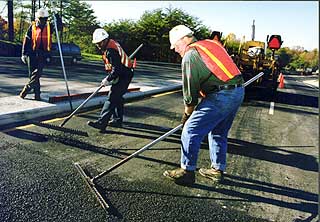
Outlook Index
Surveys
DJC.com
Next >
Back <
Recycling makes for eco-friendly highways
Our awareness of recycling is high, but many peoplewould be surprised to learn what product is recycled the most
in our nation: asphalt pavement.
By DAVID SPIVEY
Asphalt Paving Association of Washington
Since the first Earth Day in 1970, recycling has become a fact of life for most Americans. We recycle our aluminum soft-drink cans, newspapers, magazines, milk jugs and all sorts of other household products. In fact, each year we recycle about 40 million tons of household waste.

|
Although our awareness of recycling is high, many Washingtonians would be surprised to learn what product is recycled the most in our nation. It's asphalt pavement. The Federal Highway Administration and Environmental Protection Agency say that each year, 73 million tons of asphalt pavement is recycled or reused in highway applications. That's about 80 percent of the 90 million tons of pavement that is removed during maintenance operations.
Using reclaimed asphalt pavement (RAP) has economic benefits for taxpayers as well as environmental benefits. Using RAP results in lower costs. We use less virgin material and, by avoiding trips to the landfill, we use less diesel fuel. Considering today's fuel prices, these savings add up considerably for taxpayers on public road projects. And, the roads built using RAP are equal in quality to those built using all virgin materials.
If all the asphalt pavement that is reclaimed each year were put in one pile, it would form a cone 749 feet high and 1,398 feet wide. Another way of helping to visualize the enormous amount of material is to say that we could make 1,357 Washington Monuments out of it.
The extent to which RAP is reused isn't widely known, however. In a recent survey of 1,000 adults commissioned by the National Asphalt Pavement Association (NAPA), Americans ranked asphalt pavement as being recycled the least among nine products. When asked which of the nine is recycled the most, 35 percent of Americans said paper, followed by 31 percent for aluminum and 21 percent for plastic. When asked which is recycled the least, 29 percent said asphalt pavement, followed by 18 percent for rubber and 16 percent for yard waste.
|
"For every ton of municipal solid waste, our nation generates about 35 tons of non-hazardous industrial solid waste. Our landfill space would be overwhelmed if it weren't for large-scale recycling of industrial products such as asphalt pavement. The asphalt paving industry is truly a leader in this respect."
-- Byron Lord
|
In the words of Byron Lord, deputy director of the Office of Pavement Technology of the Federal Highway Administration, "For every ton of municipal solid waste, our nation generates about 35 tons of non-hazardous industrial solid waste. Our landfill space would be overwhelmed if it weren't for large-scale recycling of industrial products such as asphalt pavement. The asphalt paving industry is truly a leader in this respect." Asphalt pavement accounts for 92 percent of the nation's highways and roadways, and RAP is used as part of new pavement, roadbeds, shoulders and embankments.
A maintenance project that was just completed near Vantage by Inland Asphalt Co. of Spokane is a good example of how recycling benefits our state. The contractor milled off two inches of worn pavement along a 10-mile stretch of Interstate 90 from Vantage east, then replaced it with two inches of Superpave, giving motorists a brand-new smooth, durable, safe, quiet pavement. Superpave is the new, tough pavement being used on interstates where high performance is required.
In all, on this one job, about 55,000 tons of pavement was reclaimed. And all of it that was milled off was reused or recycled. About 20 percent of it was taken to the asphalt plant and incorporated into the new Superpave pavement. The remaining RAP was donated to a local farmer, who used it to reduce dust on the roads through his apple orchards.
Incidentally, this particular project also represents an advance in the technology of recycling and Superpave for the state. It was one of the first projects where the Washington State Department of Transportation specified the use of RAP in Superpave. Because Superpave represents a new way of designing asphalt pavement mixtures, using RAP in the project is an innovation. It worked out well: all the tests run on the pavement material during and after paving indicate that the results were outstanding. This project may open up the possibility of using recycled pavement in more Superpave projects across the state.
The roads and highways built by the asphalt pavement industry in Washington help to make the beauties and wonders of our state more accessible to all. And, by recycling asphalt pavement, we also help to conserve our precious natural resources.
David Spivey is executive vice president of the Asphalt Paving Association of Washington, Inc., the trade association that represents the asphalt pavement industry state-wide.
Top | Back | Environmental Outlook | DJC.com Copyright ©1995-2000 Seattle Daily Journal and djc.com.
Comments? Questions? Contact us.